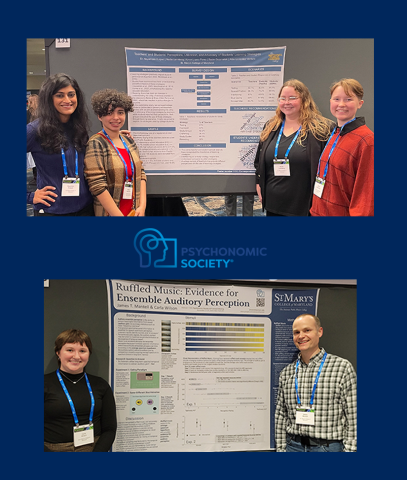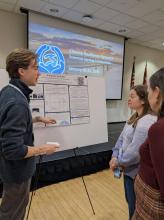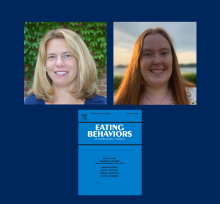
The SMCM Department of Psychology was well-represented at two national conventions in November.
On Nov. 15, 2024, Lorelai Symmes '25 presented a poster entitled "The Association Between Psychological Inflexibility and Disordered Eating Pathology: A Systematic Review" at the 58th Annual Convention of the Association of Cognitive and Behavioral Therapies in Philadelphia. The poster was based on work Symmes conducted as part of her PSYC499 (Independent Study) mentored by Adjunct Instructor of Psychology Maria Kalantzis in the summer of 2024. Psychological inflexibility (PI), the inability to adapt thoughts and behaviors, has been identified as a transdiagnostic process in disorders like anxiety and depression (Levin et al., 2014), but its relationship to disordered eating (DE) remains underexplored. The review discussed methodological limitations, theoretical implications, and future research directions, highlighting the clinical relevance of PI in DE.
The following week, students Sadie Grzymalski '26, Nadia Lonnberg '25, and Kyren Lopez Perez, alumna Carla Wilson '23, and Assistant Professor of Psychology Nayantara Kurpad and Associate Professor of Psychology James Mantell presented posters based on directed research at the 65th Annual Meeting of the Psychonomic Society in New York.
- Kurpad, Grzymalski, Lonnberg and Lopez Perez presented "Teachers’ and Students’ Perceptions, Utilization, and Advocacy of Students’ Learning Strategies." Alba Ventura Gonzalez '25 contributed to the research and was named on the poster as well. This exploratory study focused on understanding perceptions, utility, and advocacy of learning strategies. Teachers and students from Prolific Academic were surveyed regarding strategy use and advocacy. Additionally, the survey was shared with college students to understand their perceptions. The study focused on whether students adopt advocated strategies, if teachers promote them. Results from the survey indicate that the online teacher and student sample have similar perceptions and understanding of learning strategies. Interleaving as a study strategy may be less understood compared to other strategies. For future research, a college sample of teachers may provide different perspectives on the use of learning strategies.
- Mantell and Wilson presented "Ruffled Music: Evidence for Ensemble Auditory Perception." Listeners can rapidly identify complex sounds, even in noisy auditory environments. Finegrained spectral-temporal information is essential for speech and music perception, but do listeners utilize long-term spectral-temporal information to extract auditory gist? We preregistered a series of studies to investigate the mechanisms of ensemble perception via music recognition. We created ruffled music by randomly shuffling the waveform contents of music excerpts. Ruffling is ideal because randomization systematically disrupts fine-grained temporal regularity while preserving long-term spectral-temporal information. According to the average spectrum hypothesis, the auditory system extracts auditory gist by comparing moving averages for a sound’s spectrum to spectral content stored in long-term memory. In our first experiment, participants rated their recognition of popular song excerpts across six ruffle window durations ranging from not ruffled to highly ruffled. The results revealed a strong, statistically significant relationship between ruffle window duration and recognition rating, supporting the idea that audition, like vision, features multiple parallel processes that operate across various spectral/spatial-temporal modes.
Additionally, Kurpad co-organized a lunch workshop at the conference aimed toward welcoming talented young scientists to psychonomics, providing them with some tips for preparing and applying to graduate programs in psychology and encouraging them to network with one another and more senior scientists. Organizers invited panelists and presenters from a variety of backgrounds who have mentored graduate students who have pursued academic careers but also pursued opportunities in non-academic fields with their PhDs in cognitive psychology. The workshop was well attended. In a feedback survey, undergraduates mentioned that they felt welcomed at the conference and were willing to network with faculty after attending the session.



